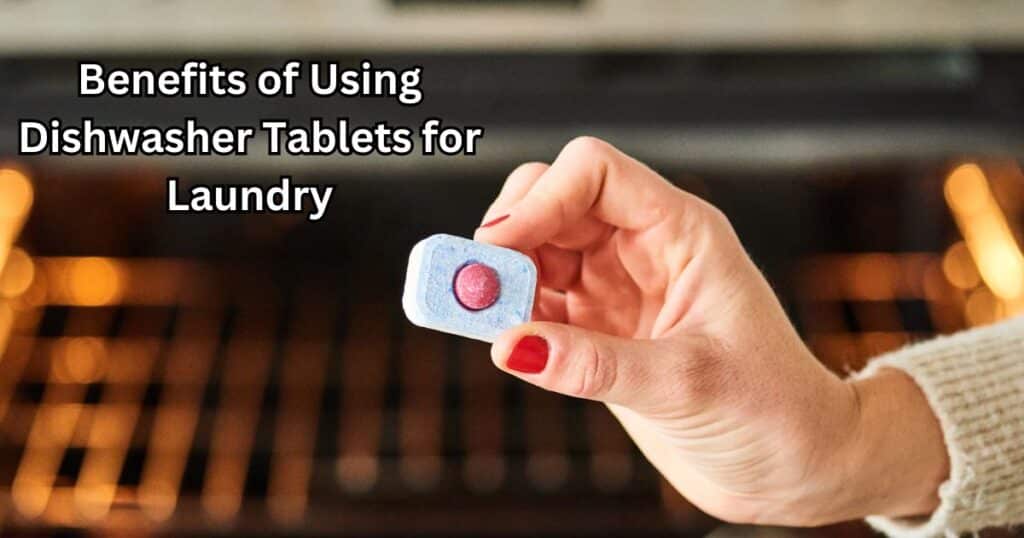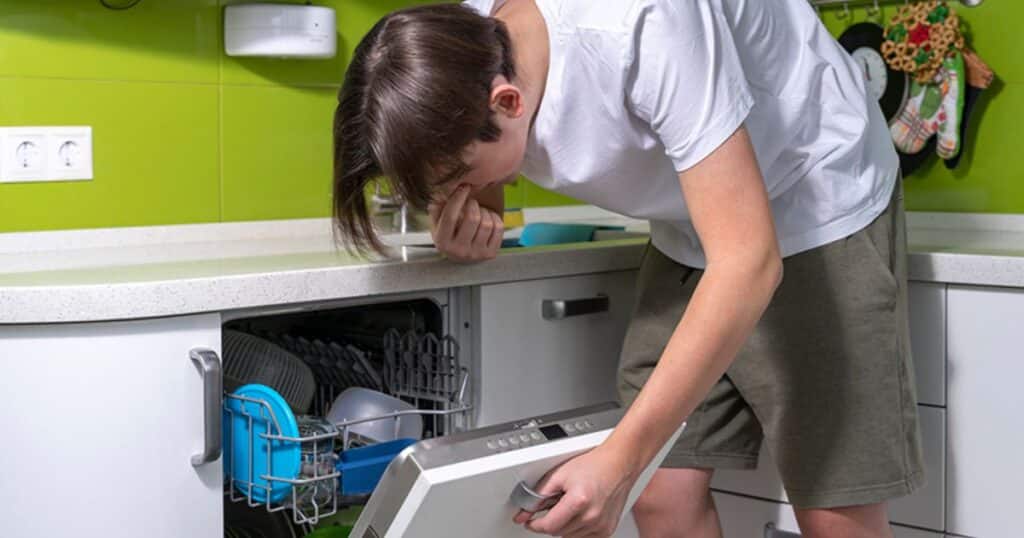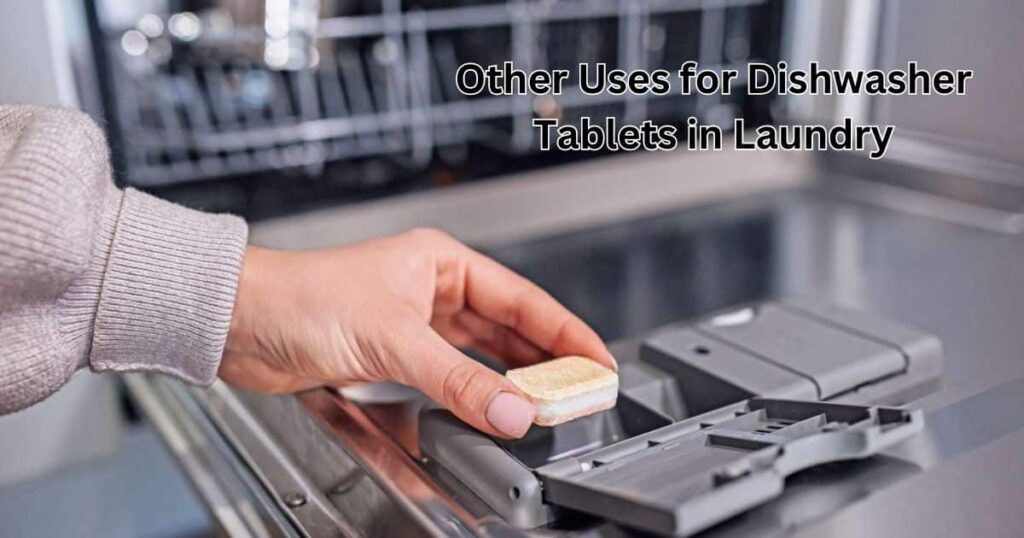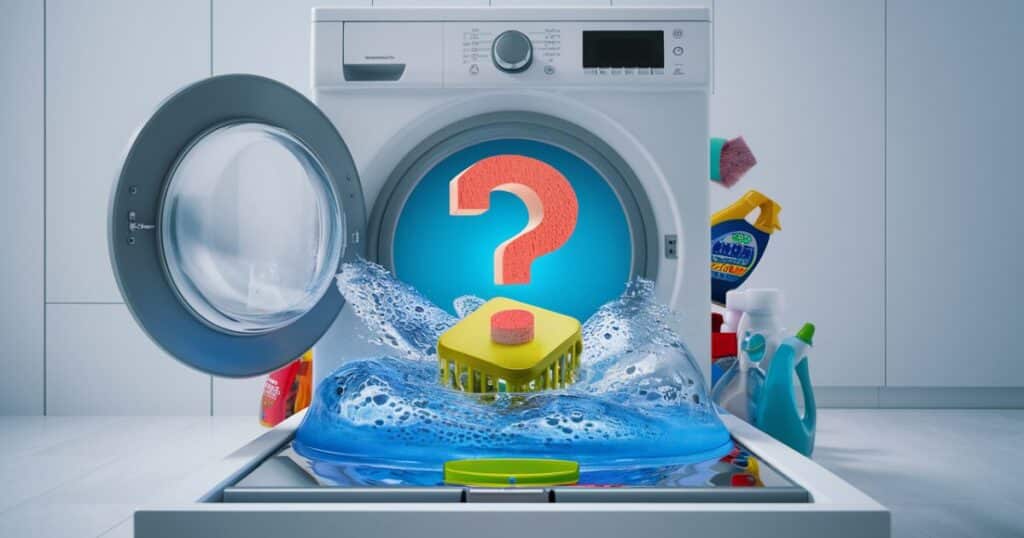Introduction to Using Dishwasher Tablets in Washing Machines
Keeping your washing machine clean is crucial for maintaining its efficiency, prolonging its lifespan, and ensuring your clothes come out fresh and odor-free.
While we often assume that the washing machine cleans itself during regular cycles, the truth is that grime, limescale, and soap scum can quickly accumulate in hard-to-reach areas, leading to unpleasant odors and potentially harboring germs.
Instead of relying on expensive specialty cleaners, an unconventional yet effective solution is to use dishwasher tablets. Yes, those same tablets you pop into your dishwasher can work wonders for deep cleaning your washing machine!
In this article, we’ll explore the science behind this method, provide step-by-step instructions, and address any potential risks or drawbacks.
Ingredients: How Dishwasher Tablets Differ from Laundry Detergents
Dishwasher tablets and laundry detergents are formulated for different purposes, and their ingredients reflect this. Laundry detergents are designed to remove dirt, oils, and stains from fabrics while preserving colors and textures. On the other hand, dishwasher tablets contain more potent cleaning agents to cut through baked-on food residue and grease on dishes and cookware.
Some key differences in ingredients include:
- Surfactants: Dishwasher tablets often contain stronger surfactants (cleaning agents) like sodium tripolyphosphate or citric acid to break down tough stains.
- Enzymes: Dishwasher tablets may have additional enzymes like amylase and protease to tackle protein-based stains.
- Bleaching agents: Chlorine-based bleaching agents are common in dishwasher tabs for whitening and disinfecting.
- Rinse aids: Dishwasher tablets include rinse aids like surfactants or polymers to prevent water spots and improve drying.
While these ingredients make dishwasher tablets excellent at cleaning dishes, they can also be effective at breaking down the gunk and residue that accumulates in washing machines over time.
Science Behind Compatibility and Effectiveness
The cleaning power of dishwasher tablets in washing machines relies on a combination of factors:
- Heat: Washing machines typically have a hot water setting around 60°C (140°F) or higher. This elevated temperature helps to activate and enhance the cleaning agents in dishwasher tablets.
- Agitation: The tumbling action of the washing machine drum provides the necessary agitation to dislodge stubborn buildup and allow the cleaning agents to penetrate and dissolve it.
- Chemical reactions: The alkaline and oxidizing agents in dishwasher tablets react with grease, limescale, and organic matter, breaking them down into smaller, more soluble particles that can be rinsed away.
This combination of heat, agitation, and chemical reactions is similar to the environment inside a dishwasher, making dishwasher tablets a surprisingly effective solution for washing machine cleaning.
How to Use Dishwasher Tablets to Clean a Washing Machine
Follow these simple steps to give your washing machine a deep clean using dishwasher tablets:
- Remove any laundry: Ensure the washing machine drum is completely empty.
- Add tablets: Place 2-4 dishwasher tablets (any brand will do) directly into the drum. For larger drum sizes (8-10kg), use the higher end of the range.
- Run a hot cycle: Set your washing machine to the hottest temperature setting, usually around 90°C (194°F), and run a normal cycle without any additional detergent.
- Maintain regularly: Repeat this process every 3-6 months to prevent buildup and keep your machine fresh.
Pro Tip: For added cleaning power, you can dissolve the dishwasher tablets in warm water before adding them to the drum. This can help ensure they fully dissolve and distribute the cleaning agents evenly.
Read More About: Can You Use a Microwave with Rust Inside? The Dangers Revealed
Benefits of Using Dishwasher Tablets for Laundry

Beyond being an effective cleaning solution, using dishwasher tablets for washing machine maintenance offers several advantages:
- Cost-effective: Dishwasher tablets are generally less expensive than dedicated washing machine cleaners, making this a budget-friendly option.
- Convenient: You likely already have dishwasher tablets in your home, eliminating the need to purchase a separate product.
- Deodorizing: Many dishwasher tablets contain fragrances that can help neutralize unpleasant odors in your washing machine.
- Versatile: As we’ll explore later, dishwasher tablets can have other clever laundry uses beyond just cleaning the machine itself.
Can You Clean Clothes With Dishwasher Tablets?
While dishwasher tablets are effective for cleaning the washing machine, it’s generally not recommended to use them for washing your clothes. The powerful cleaning agents in dishwasher tablets can be too harsh on fabrics, potentially causing damage, fading colors, or leaving residues.
There are, however, some exceptions where using a dishwasher tablet on heavily soiled or stained clothing may be okay, but only for white or colorfast items. Even then, it’s important to use caution and follow any specific instructions from the tablet manufacturer.
If you do decide to try washing clothes with dishwasher tablets, it’s best to:
- Use only a small amount (1/4 to 1/2 tablet)
- Wash in hot water
- Avoid delicate or colored fabrics
- Rinse thoroughly to remove any residue
Remember, dishwasher tablets are designed for cleaning dishes, not clothes, so use them for laundry at your own risk.
How Many Dishwasher Tablets?
The number of dishwasher tablets you’ll need for cleaning your washing machine depends on the drum size:
- For smaller drums (5-7kg): 2 tablets
- For medium drums (8-10kg): 3 tablets
- For larger drums (10kg+): 4 tablets
Using too few tablets may not provide enough cleaning power, while using too many can lead to excessive foam or residue that’s difficult to rinse away.
It’s generally best to stick to the recommended amounts and avoid going overboard, as dishwasher tablets are designed for controlled dosages in dishwashers. Overusing them in a washing machine environment could potentially lead to issues.
Alternative Natural Cleaning Methods for Washing Machines
If you prefer to avoid commercial cleaning products altogether, there are some natural alternatives you can try for washing machine maintenance:
- Vinegar: Run a hot cycle with 2 cups of white vinegar in the drum to help dissolve buildup and deodorize.
- Baking soda: Add 1/2 cup of baking soda to the drum and run a hot cycle for a gentle abrasive clean.
- Citric acid: Dissolve 1/4 cup of citric acid in hot water and add it to the drum for descaling and freshening.
These natural methods may not be as powerful as dishwasher tablets, but they can be effective for light cleaning and maintenance when used regularly.
Risks and Drawbacks
While using dishwasher tablets to clean your washing machine can be a convenient and cost-effective solution, it’s important to be aware of some potential risks and drawbacks.
What Could Go Wrong?
Void Warranty
Most washing machine manufacturers advise against using dishwasher tablets or any cleaning products not specifically designed for their machines. Using unapproved methods could potentially void your warranty, leaving you responsible for any future repair costs.
Always check your owner’s manual for the recommended cleaning procedures and approved products to avoid invalidating your warranty.
Excessive Foam
Dishwasher tablets are formulated to produce a controlled amount of foam in a dishwasher environment. However, in a washing machine with its larger capacity and agitation, these tablets could potentially cause excessive foaming.
Too much foam can clog pipes, prevent proper rinsing, and potentially damage internal components. If you notice excessive foaming, stop the cycle immediately and allow the foam to dissipate before continuing.
Tab Residue
In some cases, dishwasher tablets may not fully dissolve, leaving behind a residue in the washing machine drum or other internal components. This residue can transfer onto your clothes in subsequent wash cycles, leaving them feeling stiff or rough.
Running an additional hot cycle without any tablets can help rinse away any leftover residue. You may also need to use extra fabric softener or vinegar to restore softness to your laundry.
Lingering Dishwasher Tab Smell

Many dishwasher tablets contain fragrances or other additives that can leave behind lingering scents in your washing machine. While some people may find these scents pleasant, others may find them overpowering or undesirable on their clean laundry.
If you experience a lingering dishwasher tablet smell after cleaning your washing machine, you can try running an additional hot cycle with no tablets or detergent to help dissipate the scent. Using unscented or fragrance-free dishwasher tablets can also help avoid this issue.
Safety Guidelines
When using any cleaning products, including dishwasher tablets, it’s important to follow basic safety guidelines:
- Read labels: Always read and follow the instructions and warnings on the product label.
- Ventilate: Ensure proper ventilation in the area where you’re using the tablets.
- Protect skin and eyes: Wear gloves and eye protection to avoid irritation from the cleaning agents.
- Keep away from children: Store dishwasher tablets and all cleaning products securely out of reach of children.
- Dispose properly: Discard any leftover tablet pieces or packaging according to local regulations.
Following these simple precautions can help ensure a safe and effective cleaning experience.
Read More About: How Much Should a 10×10 Kitchen Remodel Cost?
Practical Tips for Usage
Based on research and real-life experiences, here are some practical tips for using dishwasher tablets to clean your washing machine:
- Top vs. front loaders: This method works for both top-loading and front-loading machines, but you may need to adjust the number of tablets based on drum size.
- Water temperature: Aim for the hottest water setting possible, typically around 90°C (194°F), as heat improves the cleaning power.
- Pre-dissolve tablets: For more even distribution, consider dissolving the tablets in hot water before adding them to the drum.
- Clean regularly: Perform this deep cleaning process every 3-6 months to prevent excessive buildup.
- Check for residue: After the cycle, inspect the drum and gaskets for any leftover tablet residue and rinse thoroughly if needed.
Following these tips can help ensure optimal results and avoid any potential issues when using dishwasher tablets for washing machine cleaning.
Real-Life Experiences
While the idea of using dishwasher tablets in a washing machine may seem unconventional, many people have had success with this method. Here are a few real-life experiences:
“I was skeptical at first, but using dishwasher tablets to clean my washing machine worked like a charm! The drum looked brand new, and the musty odor was completely gone.” – Sarah, Toronto
“I tried this hack with some cheap dishwasher tablets, and it did a decent job of cleaning the machine, but I noticed some residue left behind. Next time, I’ll use a higher-quality tablet and dissolve it first.” – Mike, London
“After moving into my new place, the washing machine smelled terrible. A few dishwasher tablets and a hot cycle later, it was like having a brand-new machine! I’ll be doing this regularly from now on.” – Emily, Sydney
As with any cleaning method, results can vary based on factors like the severity of buildup, the specific products used, and how closely instructions are followed. However, many people have found this technique to be an effective and affordable way to maintain their washing machines.
Other Uses for Dishwasher Tablets in Laundry

While not recommended for regular laundry use, dishwasher tablets can have a few other clever applications in the laundry room:
- Stain pre-treatment: Rubbing a damp dishwasher tablet directly onto tough stains can help break them down before washing.
- Deodorizing: Adding a half-tablet to the wash can help eliminate odors from smelly gym clothes or musty towels.
- Whitening: The bleaching agents in some dishwasher tablets can help whiten and brighten white fabrics.
Remember, these are occasional uses, and it’s still best to stick to regular laundry detergent for most washing needs.
Conclusion: Making Informed Choices
Using dishwasher tablets to clean your washing machine can be a convenient, cost-effective, and surprisingly effective solution. However, it’s important to weigh the potential benefits against the risks and drawbacks, and make an informed decision based on your specific situation.
If you choose to try this method, follow the recommended guidelines carefully, use caution, and monitor for any issues. Additionally, always check your washing machine’s owner’s manual and avoid any methods that could potentially void the warranty.
Ultimately, the choice is yours – but with the right precautions and approach, dishwasher tablets can be a valuable tool in your laundry room arsenal for keeping your washing machine clean and fresh.
Read More About For Related Posts…







